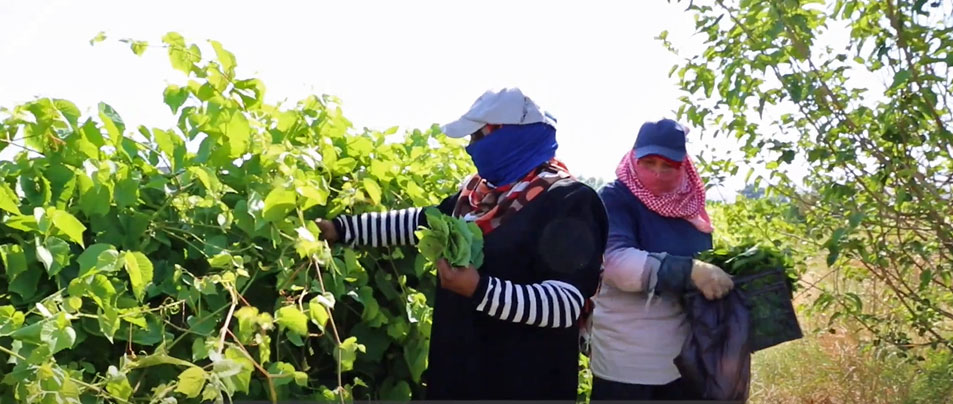
May 21, 2021
بالعربية
Agricultural workers in Jordan for the first time have fundamental protections on the job, including guarantees for safe and decent working conditions, following a two-year campaign by the Agricultural Workers Union in Jordan and its allies that resulted in passage of a historic regulation covering the agricultural sector.
“This is quite a landmark in Jordan. It’s the first time this type of legislation has passed,” says Hamada Abu Nijmeh, director of the Jordan-based Workers’ House for Studies. Under the regulation, any provision not mentioned falls under purview of national labor code.
The law applies to all workplaces that employ more than three agricultural workers, who now will receive 14 days annual paid leave and 14 days paid sick leave (or more, in cases of serious illness). Women are guaranteed 10 weeks paid maternity leave and there are now first-ever provisions for overtime pay. Significantly, the legislation also covers migrant agricultural workers, who frequently are not protected by countries’ labor laws.
COVID-19 Makes Visible Essential Workers
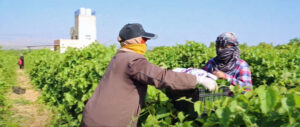
Agricultural workers in Jordan were key to developing the new labor regulation improving wages and working conditions.
Prior to passage of the regulation this month, there were no mandated safety inspections of farming facilities, leaving workers vulnerable to dangerous and unhealthy working conditions, such as exposure to poisonous pesticides. Agricultural workers, most of whom do not have formal labor contracts and are part of the country’s vast informal economy, were paid extremely low wages with no health insurance or other social protections. Working long hours, they were not guaranteed a day off during the week and not paid overtime. They were denied the freedom to form unions—the Agricultural Workers Union is not recognized by the government. Migrant workers still do not have the right to form unions under the new law.
Although a labor law covering agricultural workers was passed in 2008, the government never moved to put it in place, says Mithqal Zinati, union president. But as the COVID-19 pandemic highlighted essential workers like those who literally feed the world, the government became more receptive to the union’s campaign to ensure decent working conditions in the vineyards and fields.
“The agricultural sector is the food basket, the key source of stability that needs to be given priority to contribute to the stability of Jordanian state itself,” says Abu Nijmeh. “Part and parcel of that is to provide protection of workers. We told [the government] if you want to see this sector successful, you need to provide its protection.”
Abu Nijmeh and Zinati spoke with the Solidarity Center through interpreters.
Danger on the Job and Getting to Work
For Jordan’s 210,000 agricultural workers, more than half of whom are women, the day begins before dawn as they rush to meet the crowded trucks that transport them to the fields in the fertile Jordan Valley. Picking cucumbers, melons and okra in summer, citrus fruits in winter, the workers also weed fields, install water pipes and spray crops. They often are denied breaks, even as they work in the burning sun and harsh cold, and women have no access to toilets, leaving many with serious kidney issues and other illnesses, says Zinati. Just this week, a worker died of sun stroke in the fields, Zinati says.
Before they even arrive at the farms, women are subject to unsafe conditions on the packed vehicles they must use to get to work. Some 86 percent say they were involved in an accident on the commute, and 41percent say they are subjected to sexual harassment and other forms of gender-based violence during the journey, according to a study by SADAQA, a nonprofit organization championing the rights of women in Jordan. SADAQA produced the study, “Women Agricultural Workers in the Jordan Valley: Conditions of Work and Commuting Experiences and Challenges,” with Solidarity Center support.
Twenty or more workers are packed in a van licensed for five passengers, sitting on top of each other and in the luggage compartment, says Zinati. The vans take back roads to avoid police because they are not licensed, or licensed only to transport crops and other goods, and workers frequently suffer injuries as the overcrowded vehicles crash on the rough roads. Because most women work in shifts, they must commute two times per day, says Randa Naffa, SADAQA co-founder, speaking through a translator.
Together with the Solidarity Center, SADAQA produced a video on the outcome of the study documenting the hazards women face commuting to the fields. SADAQA, part of the Alliance to End Gender-Based Violence and Harassment in the World of Work, is using the video to campaign for regulations covering agricultural transport. The alliance is pushing the government to ratify International Labor Organization Convention 190 on ending gender-based violence and harassment at work. Convention 190 makes clear that employers and governments must take measures to ensure workers are safe on their work commute as well as in the physical workspace.
Worker Involvement Key to New Regulation
Agricultural workers were key to designing the new regulation. Beginning in 2019, leaders at the union and the Workers’ House met with workers on the farms to determine their needs and priorities. With worker input forming the basis of the draft regulation, campaign leaders applied labor regulations and human rights provisions from international standards and legislation from other countries to create a model regulation. The Workers’ House and the Solidarity Center then organized a meeting of agricultural workers to discuss the draft again and plan campaign steps, including social media outreach.
They formed a coalition with civil society organizations to launch an advocacy campaign that included petitions and public statements to the Ministry of Labor and other government officials which, along with social media outreach to mobilize public support, was key to moving the government to pass the regulation protecting these essential workers.
“I heard from the Ministry of Labor they said they were listening to, keeping abreast of what was spread in the media,” says Abu Nijmeh.
“The regulation that has just been promulgated, we hope it will protect female workers in this sector and it is the opportunity to create the political will to recognize the importance of women’s contributions to the agriculture sector and the importance of women’s contributions to other informal sectors,” says Naffa.
Worker Education Essential for Success
Abu Nijmeh, Zinati and Naffa all emphasized the need to ensure implementation and enforcement of the new regulation, especially workplace inspection, safety and health and child labor. Under the new regulation, children younger than age 16 cannot work in agriculture and those between ages 16 and 18 can only be engaged in non-hazardous work.
The regulation “shall never be enforced without pushing,” says Naffa. “We need to lobby more, engage in campaigns, reach out to the Labor Ministry, the Transport Ministry.” Key to its success is widespread education of agricultural workers about their rights, says Zinati.
A long-time union organizer who began by unionizing court workers in Beirut, Lebanon, Zinati says union committees are now set up in every village, and literacy classes and other education opportunities are offered so workers can better champion their rights.
“If I see people who are done an injustice, who are oppressed, the only way for them to gain their rights is for them to unite,” he says. “This legislation opens the horizon so workers can play a bigger role in pushing their rights,” he says.
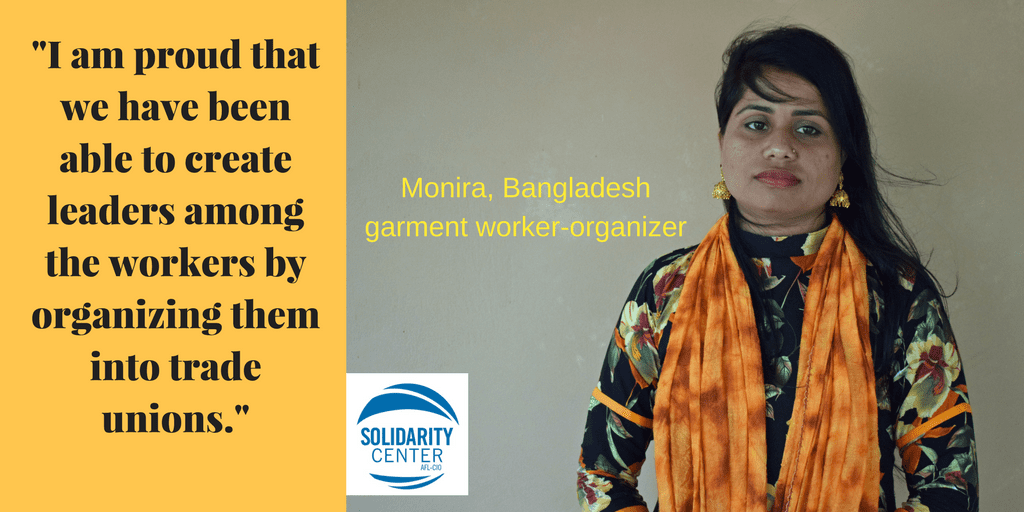
Apr 9, 2018
Five years after the deadly Rana Plaza building collapse in Bangladesh, workers and union activists say despite the massive demand from workers for union representation to achieve safe workplaces, worker-organizers must face down threats, harassment and violence to educate workers about their rights on the job.
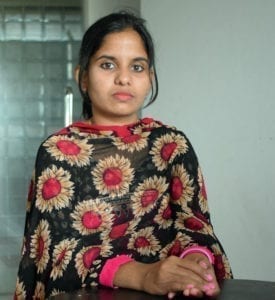
Shamima Aktar is among Bangladesh garment worker-organizers empowering workers. Credit: Solidarity Center/Mugfiq Tajwar
Since the April 24, 2013, tragedy in which more than 1,130 garment workers died and thousands were injured, the government has approved a little more than half of the garment unions that have applied for official registration, according to Solidarity Center data. Confronted with employers and a government hostile to worker organizations, worker-organizers have sometimes risked their lives to help workers improve wages and working conditions.
Shamima Aktar, a garment factory worker and organizer with Bangladesh Garment and Industrial Workers’ Federation (BGIWF), is one of them. During a meeting with management at a newly unionized factory, managers refused to grant a demand made by the factory union that salaries be paid on a timely basis. Instead, Shamima and the other union representatives were locked in the building and beaten, she says.
“But what moved me was that hearing about our abuse, 17 trade unions around the community immediately came to our aid and barricaded the whole factory which we were in. The workers needed us on their side to be able to live in peace and I wish to [keep organizing] no matter how difficult it is for me,” she says.
Through persistence and courage in the face of daunting odds, worker-organizers have helped garment workers form unions despite the severe obstacles. In Bangladesh, more than 200,000 garment workers at 445 factories are represented by unions that protect their rights on the job.
“I have worked day and night, went to gates of factories to talk to the workers, walked with them to their homes to earn their trust and to make them aware of how they are being exploited and deprived of their rights,” says Monira Aktar, an organizer with the Bangladesh Independent Garment Workers Union Federation (BIGUF). “So far, we have united 2,250 workers into trade unions, and they say that we give them courage and hope. For me, these words are enough to encourage me to work on for them.”
Poverty Wages, Safety Improvements
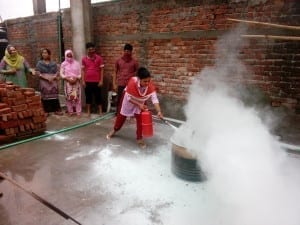
Thousands of garment workers have participated in the Solidarity Center’s 10-week fire safety certification course. Credit: Solidarity Center/Rakibul Hasan
Wages in Bangladesh are the lowest among major garment-manufacturing nations, even though the cost of living in Dhaka is equivalent to that of Luxembourg and Montreal. The country’s labor law falls far short of international standards, and the Bangladesh government has failed to enact meaningful legal reforms, including addressing the arbitrary union registration process that is vulnerable to employer manipulation. Without a union, garment workers often are harassed or fired when they ask their employer to fix workplace safety and health conditions.
But due to international action after the Rana Plaza disaster, which occurred months after a deadly fire at Tazreen Fashions Ltd. factory killed 112 mostly female garment workers, a variety of efforts to prevent unnecessary deaths and injuries due to fire or structural failures—including the Bangladesh Accord on Building and Fire Safety—have remedied dangers at more than 1,600 factories.
The Solidarity Center has trained more than 6,000 union leaders and workers in fire safety, helping to empower factory-floor–level workers to monitor for hazardous working conditions and demand safety violations be corrected.
Such international attention has opened up space for workers to collectively demand—and win—improvements on the job, says Monira.
“I am proud that we have been able to create leaders among the workers by organizing them into trade unions. In the past this would have been close to impossible.”
In Bangladesh, the Solidarity Center implements the Workers’ Empowerment Program – Components 1 and 2, which provides training and rights education to garment workers and organizers, with the support of USAID.
Iztiak, an intern in the Solidarity Center Bangladesh office, interviewed the worker-organizers in Dhaka.
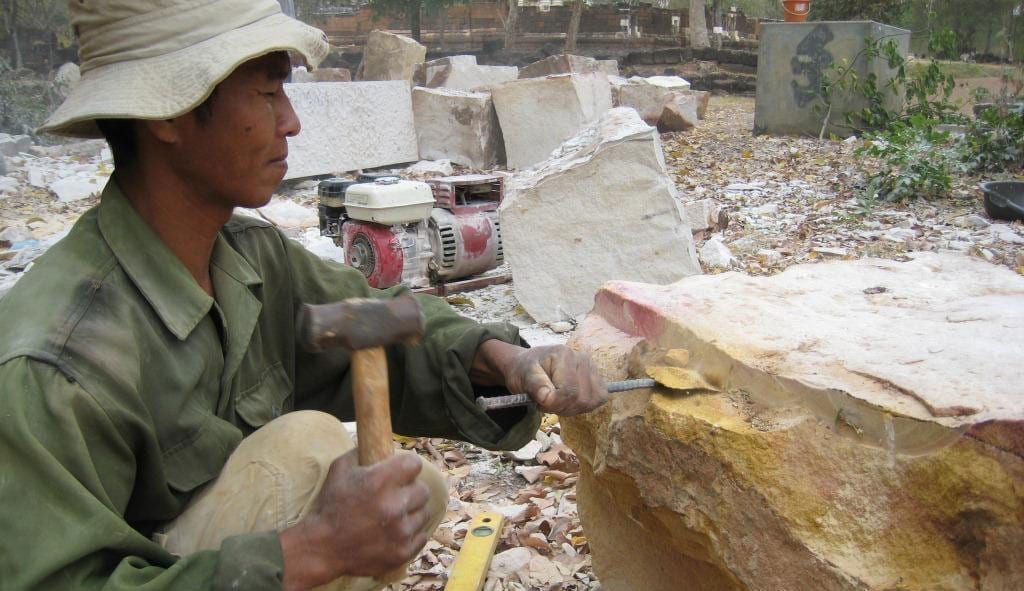
Jun 2, 2017
In Cambodia’s booming construction industry, where up to 250,000 workers toil on building projects during peak season, laborers wear sandals or flip-flops and cloth gloves, if they have gloves at all, their heads covered only with towels or soft hats they bring to work.
One-third are women, who receive lower wages and are limited to the least skilled tasks that offer no opportunities for training and advancement. These construction workers risk their lives each day on the job, scaling tall structures without harnesses, helmets or other safety equipment and often are not paid for weeks. Their wages are disproportionately lower than the wages of foreign workers. At one site, for instance, a foreign worker receives $1,000 per month with a $300 allowance while his Cambodian colleagues receive between $160 and $240 a month.
Cambodia’s construction industry is one of the fastest growing sources of employment. In 2015, construction became the most dynamic driver of the country’s gross domestic product (GDP), outpacing the country’s garment and footwear industries. Corporations from China, South Korea, Japan, and Thailand—at least 18 countries in all—have directed 284 projects, a construction area nearly five square miles worth $4.3 billion, between 2000 and August 2016.
Cambodia Workers Have Little Freedom to Form Unions
The country’s lack of a labor inspection system to ensure compliance with national labor law allows employers to avoid receiving fines or other punitive measures when workers are injured on the job or are paid subminimum wages. As a result, construction workers do not have access to fundamental workplace rights like safety equipment, as stipulated in the country’s labor laws. Workers also receive little or no safety training.
“Based on a report we conducted in 2015, we discovered that more than 2,000 construction workers have been injured on construction sites,” says Yann Thy, secretary-general of Building and Wood Workers Trade Union Federation of Cambodia (BWTUC). “Out of this figure, 36 died.”
Yet when they seek to form unions and improve their working conditions, they often suffer retaliation, violence and imprisonment, as do garment workers and other workers across Cambodia, according to the International Trade Union Confederation (ITUC).
A 2016 trade union law further limits workers’ ability to negotiate over their working conditions and pay. Cambodia is now one of 10 countries ranked the worst for working people, according to the ITUC’s annual Global Rights Index.
Despite the obstacles, BWTUC, assisted by the global union, Building and Wood Workers International (BWI), the Solidarity Center and other international rights organizations, assist construction workers across Cambodia to form unions, enabling workers to break the cycle of poverty perpetuated by low-wage, dangerous jobs.
From $1 a Day to $15 a Day with a Union
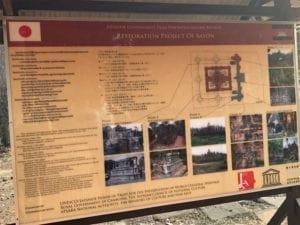
Angkor Archaeological Park generates $63.6 million in ticket sales but reconstruction workers are paid as little as $1 a day. Credit: Solidarity Center/Jennifer Bogar
When tourists enter Cambodia’s massive Angkor Archaeological Park, they are greeted by stunning temples carved with intricate sculptures built for the Khmer Empire, ruler of a large portion of Southeast Asia between the ninth and 15th centuries. Spreading over 154 square miles, the complex contains hundreds of buildings and monuments that had long decayed in disrepair.
Many buildings have now been restored, and while tourists encounter ancient structures resembling their original state, they are less likely to notice the construction workers laboring in often brutally hot conditions to make tourists’ trips Facebook friendly.
As a World Heritage site, Angkor is covered by United Nations Educational, Scientific and Cultural Organization (UNESCO) restoration and conservation guidelines which provide for architectural and environmental safeguards—but include no such protections for workers.
Chhen Sophal worked for years on the massive Baphuon Temple, eating little for lunch and dinner so he would have enough money to support his family.
With support of a union federation that later merged into BWTUC, and the global union movement, the workers held an official union election and ultimately negotiated with their employer, raising wages to $15 a day and securing payment in dollars, which are more easily exchangeable than the Cambodian riel. Through ongoing pressure, they also ensured their employer keep its commitments to provide health care, workplace safety improvements and full implementation of 18 days paid annual leave.
Yet Chhen Sophal, who was a union leader at the site, knows that hundreds of thousands of construction workers across Cambodia still receive below-poverty wages, and he seeks to improve conditions beyond his workplace.
“In the future, I hope that we will be able to push for a sector minimum wage for the restoration workers,” he said through a translator. “I want to stand up for wages for next generation—even outside of restoration and construction sector.” Chhen Sophal says he wants to ensure that if his children become construction or restoration workers, they will receive decent wages and their workplaces will be safe.
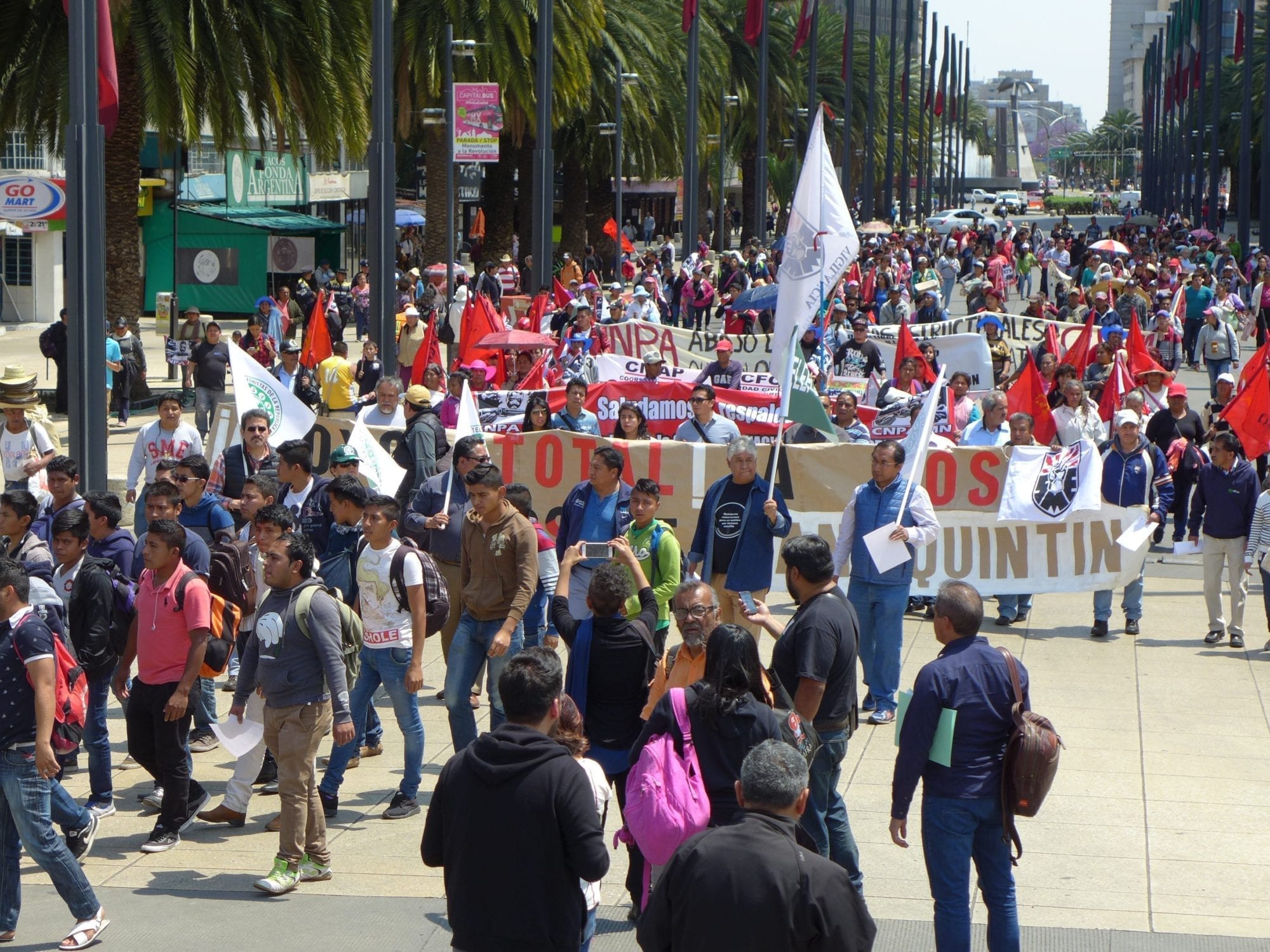
Mar 21, 2017
Dozens of day-labor farm workers (jornaleros) demanded improved wages, democratic representation, an end to sexual harassment and access to clean water as they marched across Mexico in a national caravan, “Fair Wages and Dignified Life.”
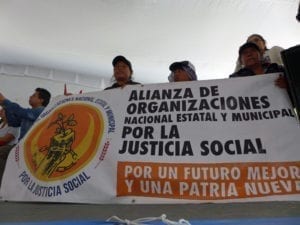
A proposed new law would make it much harder for farm workers to get compensation for job injuries. Credit: Solidarity Center/Gladys Cisneros
The workers, who left Baja California March 4 and arrived in Mexico City on March 17, sought to raise renewed awareness of their struggle for decent working conditions in the San Quintin Valley and hold employers accountable for their failure to uphold agreements reached in 2015. Although the settlement negotiated in 2015 included raising day wages to between 150 and 180 pesos (approximately $7 to $9), these wage levels have been unevenly applied.
“We are here to demand the same things we have been asking for, for two years,” says Lorenzo Rodriguez, general secretary of the SINDJA union.
Following the 2015 jornaleros strike, workers formed a national independent union that has grown to include farm workers from four Mexican states. Registering their independent union, SINDJA, is the only demand that has been met so far, say union leaders. Workers negotiated the agreement with the government, but the agribusiness owners and growers must comply.
“We don’t even have the right to live,” says farm worker leader Bonifacio Martinez. “And with proposed new government reforms, we are forbidden to get sick at work,” he adds, referring to proposed legislation that would place government and employers, not medical professionals, in charge of determining whether an injury is work-related.
A 2015 Los Angeles Times series found many workers on export-oriented farms “essentially trapped for months at a time in rat-infested camps, often without beds and sometimes without functioning toilets or a reliable water supply.”
The national caravan included families of the 43 disappeared students of Ayotzinapa, who continue to seek answers and justice. The march coincided with the two-year anniversary of a historic 12-week strike and popular mobilization in the San Quintin Valley.
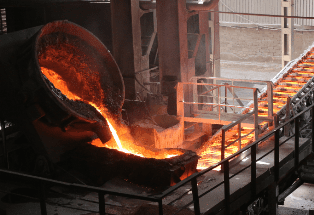
Nov 30, 2016
Workers at the Zestafoni Ferroalloy factory in Georgia’s Imereti region successfully negotiated a contract after five months of negotiations with their employer that includes wide-ranging workplace safety and health improvements, wage increases and social benefits.
The three-year pact finalized earlier this month at the country’s largest silicomanganese processing plant establishes 40 hours as the standard work week, provides employees with health coverage, boosts pay for overtime and dozens more provisions.
Tamaz Dolaberidze, president of the Metal, Miner, and Chemical Workers’ National Trade Union (MMCWTUG) which represents the workers, says the contract is the first collective agreement based on the principles of social dialogue and social partnership at Zestafoni. The pact also includes language to ensure commitments are implemented and maintained.
Previous contract agreements, including one reached in 2010 and the other in 2013, were settled only after difficult strikes.
Earlier this year, MMCWTUG and the Georgian Trade Unions Confederation (GTUC) assisted 750 Georgia coal miners in Tkibuli and 170 glass factory workers in Ksani in making big gains at the workplace after long strikes by workers at both sites.










